J.D. Vance, Donald Trump Jr., Elon Musk, and the Coming Far-Right Fascist Dynasty
The MAGA agenda goes beyond a four-year second Trump term or a medium-term shift in how America does business. It’s a scheme to ensure your kids and grandkids don’t live in America as you’ve known it.
You can now sign up for an annual Proof subscription at a 30% discount (just $3.50/month). This is the lowest price ever for a year-long subscription to Proof; it’s good until October 31st.
Introduction
When Donald Trump chose Ohio senator J.D. Vance as his running mate, journalists took the news one of two ways. Either they harped on all the terrible things Vance has said about his new boss in the past—voluminous but essentially immaterial reportage, as Americans no longer care about hypocrisy unless it scores their “team” political points—or they focused on how little Vance brings to the 2024 Republican ticket.
Yes, Vance has said terrible things about Trump, and yes, he appeals only to the same voters Trump already appeals to and very few others, but is that really the worst that can be said about him? That he supports a national abortion ban, that like Trump he has no interest in keeping Europe free from Russian war crimes, and that much like his new political patron he’s a sort of rich author and entrepreneur with ties to the sketchiest billionaires in America, one who talks a good game about identifying with the American working class but doesn’t support any policies that would benefit them?
All this is true—and would be more surprising and troubling in a world where the 2024 Republican presidential nominee wasn’t a confirmed rapist, a 34-times-convicted felon, a serial sexual predator, a serial philanderer, a man who currently owes nearly half a billion in civil fines for the torts he’s committed, a traitor to the United States, a defendant in pending criminal cases in Georgia and D.C. and an unindicted criminal co-conspirator in at least three jurisdictions (New York, Arizona, and Michigan), a man who told over 30,500 provable lies when he was president, and… need we go on?
Must we add in all the middle-class contractors he screwed out the money he owed them after they’d done the work for him their contracts required? His admission that he won’t pay overtime, contrary to federal law? The six bankruptcies? All the foreign dictators he does business with? His historic two impeachments (I, II)? Violations of the Emoluments Clause? His injection of violent and racist rhetoric into U.S. politics to a degree not seen since the Civil Rights Era? The Trump University scam? How about his stealing from charities? Calling American soldiers “losers” and “suckers”?
The point is, these and other atrocities that were introduced to our national political discourse by Trump launching a political career—and this list is by no means close to exhaustive—positively dwarf anything that could be said about Trump’s running mate, so how much does the latter category of content move the political needle for anyone?
It’s all weaksauce—as clearly MAGA voters broadly writ, and a significant percentage of the white working class in American specifically, decided years ago (with the Tea Party) that Democrats supporting policies that benefit them is far less important than Republicans saying they do. Why? Because these voters have reasons for supporting Republicans that they simply don’t want to talk about. In some instances what’s in play are cultural debates or religious dogma, but often enough it’s something darker.
Is the mysterious missing piece here a swirling maelstrom of latent racism, misogyny, antisemitism, homophobia, transphobia, xenophobia, ableism, and/or Islamophobia?
Sure, for some MAGAs it probably is.
Is it that these voters categorically do not read the mainstream news outlets governed by tried-and-tested journalistic ethics, digesting instead a steady diet of disinformation each day that perverts their understanding of our world? Sure, that’s definitely one of causes of the false consciousness the Republican establishment has engendered in the working class. Do some MAGAs vote against their interests because of peer pressure (including familial pressure), lack of any political news consumption at all, a nihilistic bent, the treatment of politics as entertainment rather than consequential policy, or another eldritch causal chain political scientists habitually miss? Surely a possibility.
But whatever the reason for nearly half of Americans being willing to vote for literally the least qualified presidential candidate in American history—yes, going back to the Founding—nothing media has been saying about J.D. Vance is going to change that, whether it’s his bizarre opining on “childless cat ladies” or his general stiffness in all social settings. Sure, these elements of Vance’s political persona could act as a GOTV (“Get Out the Vote”) goosing for the Democratic Party, but they’re not shifting votes.
Candidly, running-mate picks rarely do—even if Vance is one of the least popular ever.
Vance would, if he ever became President of the United States, do more or less exactly what Trump has and (if re-elected) will again: sell naked populism to the masses while spending his time in office blocking every Democratic bill intended to make life fairer and better for the non-rich. While Vance, unlike Trump, is a military veteran, his time in the Marines was spent in comms—so he wasn’t the Hollywood-style killing machine Trump cartoonishly likes to imagine all American soldiers as. Certainly, if Trump has never been hurt politically for being a notorious draft-dodger, and if he already has significant support in the military and law enforcement (which appears to be the case, though it makes no sense given that he has contempt for our troops and is a criminal), there’s no clear way in which Vance’s service significantly advantages the GOP ticket.
So if Mr. Trump didn’t need Vance on the ticket for what many journalists now oddly insist he helps with—the working-class vote in President Biden’s fabled “blue wall” of Michigan, Wisconsin, and Pennsylvania, where any MAGA voters are already as sure Trump is in their corner as historians are that the man has no interest in helping them whatsoever—what, exactly, did Trump want Vance for? It certainly isn’t nothing.
The answer may surprise you. And it should certainly unnerve all of us. Because it has nothing to do with this election cycle, and everything to do with the future of America.
Behind the Vance Pick
Sharp readers will notice that one aspect of J.D. Vance’s still wholly theoretical appeal as a politician hasn’t been mentioned yet: his relative youth. (He’s only forty years old.)
This may be of importance to Trump—though likely not for the reason you’re thinking.
Trump has little need to make his ticket seem younger, as corporate media has already done him the solid of pretending he’s not 78 years old but essentially timeless; while in his current president run he gets confused in public more and does dramatically fewer public events than in 2016 (see chart below), and while he is approaching his eightieth birthday as a man who’s doctored and lied about his medical records from the day he entered politics, the same corporate media that chased Joe Biden from the 2024 presidential election with often vividly unfair framings of his advanced years and their influence on his capabilities has nothing to say on the same issue as to Trump.
In other words, yes, it’d make sense for Donald Trump to be concerned about picking a young running mate for cosmetic purposes (see image below), but that doesn’t appear to be an issue U.S. media has put on the table or that Trump perceives as being there.
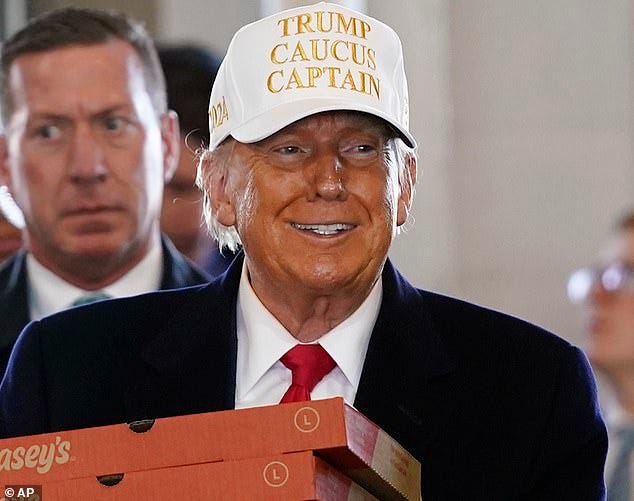
If anything, Vance’s youth could be, on the face of it, a detriment to Trump. Vance had only been a politician for eighteenth months when Trump chose him to be his running mate, and in that time he didn’t distinguish himself in the United States Senate. He has neither sponsored nor co-sponsored any legislation that became law, making him little more than a backbencher with no accomplishments in Washington to his name.
In fact, the way Vance’s life has unfolded, his success as an author actually eclipses in every respect both his military career (such as it was) and his time in Congress (such as it is). Vance’s book Hillbilly Elegy is the most notable project he’s ever been behind, and it was widely panned as a book even before it was widely panned as a movie. Sure, it made a lot of money, but so did the only film this author has ever walked out on in a theater, Batman Forever ($336.53 million gross worldwide). Lucrative does not mean good, and Vance’s melodramatic and frankly condescending portrayal of the white working class became even more inauthentic when Vance ran off to Silicon Valley for less than sixty months of kowtowing to venal billionaires who viewed him as a proxy and an instrument for future political power, not a genuine peer.
If George Papadopoulos was once farcically called a “coffee boy” by Team Trump in the Trump-Russia scandal that Papadopoulos actually launched with his loose lips, Vance’s time in California more or less positioned him as merely actual coffee boy to billionaires—the same far-right billionaires, like Elon Musk and Peter Thiel, who pulled strings to propel Vance to national prominence and eventually a 2024 ticket they may well feel they more or less control (in part because Trump is mainly running to avoid prison, not serve notional constituents; it’s mostly advisers who’ll be running America if Trump is re-elected).
In short, the story of Vance’s youth is the story of his surprisingly unimpressive CV. It looks good from far away, but it’s far from good up close. And being a major-party VP candidate is nothing if not an opportunity for Americans to scrutinize pols up close.
Sidebar: J.D. Vance’s Headline Gallery
One could argue that Vance is simply the running mate a politician picks if he’s sure he’s going to win—and admittedly, at the time Trump picked the senator from Ohio, things were looking pretty good for him—but it’s hard to see how a Midwestern pol automatically would have brought Trump the 70,000 votes or so he needed to ensure victory in Michigan and Wisconsin, given that citizens of the two latter states rather notoriously have a dim view of Ohioans in part (yes, really) because of college sports.
Indeed, the two states nearly went to war with one another. Yes, really—an actual war.
It feels like grasping at straws to treat the Midwest as politically discrete. After all, blood-red Iowa and Missouri and Kentucky and Indiana border deep-blue Illinois, and Ohio shifting red over the last twenty years hasn’t brought its northern neighbor along with it any more than Iowa’s reddening has had that effect on its own northern neighbors, Minnesota and Wisconsin. For that matter, depending on who’s doing the defining, the Midwest can extend all the way from Pennsylvania in the East to Kansas and Nebraska in the West. So the notion that J.D. Vance, who isn’t even much-beloved in Ohio, was going to be a game-changer for Trump in a whole region of the country is silly and unlikely to have been Trump’s thinking in making his highly unpopular pick.
As a Trump biographer, my first inclination after Vance was picked was to presume that he’d simply flattered Trump longer and better than Sen. Marco Rubio (R-FL) or Gov. Doug Burgum (R-ND) had, as all three men had had sharp-tongued words about Trump in their past they had to live down, as well as a historically lukewarm embrace of MAGA they needed to magick away. Trump likes being admired by young military men—yes, really, it’s a thing—so one could be forgiven for thinking he simply felt like a bigger man standing beside Vance, or that hoped his running alongside a Marine would make him more palatable to independent and moderate conservative voters who are aware deep down that Trump is physically, spiritually, and morally disgusting.
This is the “central casting” idea journalists bring up whenever Trump hires anyone.
And generally speaking, there’s some truth to it, even if certain of Trump’s decisions about who “looks the part” have the feel of Monday-morning quarterbacking. Did the former president really see Rex Tillerson and James Mattis as John Wayne types, or did he decide that their achievements weren’t enough to justify their positions, so he played up the former as a famous powerbroker and the latter as “Mag Dog”? Certainly Trump used the same bit with his aged friend Carl Icahn while running for president in 2016, regularly name-checking a man no one outside certain nouveau riche circles had heard of in a bid to fool rubes into thinking he knew all the “best” people. In fact, his rather limited friend and acquaintance circle is a veritable cornucopia of D-listers.
Donald Trump understands that the while the choice of a Vice President is among the most high-profile a would-be POTUS makes, it’s among the least consequential, too.
But he also knows that that conventional wisdom manifestly doesn’t apply to him.
Trump knew that his selection of a running mate was of utmost importance for at least five reasons:
He believes he’s less likely to be impeached if his replacement is unpalatable;
he believes he’s less likely to be assassinated if his replacement is unpalatable;
he believes his odds of holding onto power beyond a second term—mirroring what his new idol Nayib Bukele of El Salvador did in illegally remaining head-of-state in contravention of his nation’s explicit prohibitions—are exponentially higher if he has a vice president willing to do anything to back him up (see, e.g., his reaction to Mike Pence not doing his bidding on Insurrection Day in 2021);
as he learned when he had to go to Walter Reed Military Hospital in November 2019 and was told by his aides to transfer presidential power—which he refused to do, apparently not trusting that Pence would return it (his then-press secretary Stephanie Grisham reports in her post-White House memoir that, as CNN has summarized, “Trump did not want then-Vice President Mike Pence to be in power while he was sedated”)—he needs a running mate so loyal that if he had a medical emergency, which is almost a certainty at his age and given his diet, he could be sure, even with in his profound paranoia, that his VP wouldn’t use such an incident to seize power or undo any of his prior directives; and
he’s aware that his Trumpism is a rebellion within—arguably, a hostile takeover of—the Republican Party, and that the cult of personality he’s formed may collapse at any moment if the people closest to him aren’t fervent, diehard believers in the “MAGA” idea (which is, after all, not a series of first principles or values but the opposite of that: a robber-baron-like commitment to opportunistic, venal nihilism cloaked in disinformation, throwback xenophobia, and an ultra-histrionic puffery).
So there was every reason—the five listed above, and many more esoteric—for major media to apprehend that Trump’s vice presidential pick was unusually important. We must remember that this is a man who thinks he would still be president right now if he’d simply picked a better running mate in 2016. Is that really true? No. But he thinks so.
And yet, when CNN and the New York Times turned, as they often do, to the daughter of one of Trump’s public relations flacks, Maggie Haberman, for the latest scuttlebutt from inside Team Trump about the Vance pick—knowing, as these outlets know from experience, that to preserve her access to Trump Haberman often seems to limit her analyses to words Trump is willing to hear—the so-called “Trump Whisperer” made no mention of the relationship between Vance and Donald Trump Jr., Trump’s eldest son. Haberman’s refusal to acknowledge the bromance between the two is shocking.
It’s also telling.
In analyzing the Vance pick on-air during its earliest days, Maggie Haberman made no mention of the fact that it was Trump Jr. who—along with white supremacist Elon Musk and white supremacist Tucker Carlson, the latter of whom, incredibly, insisted the “Deep State” would assassinate Trump if he didn’t pick someone as clearly odious as Vance—made a forceful late push for the former president to pick the Ohio senator as his running mate.
By eliding Trump Jr. from the story of how Vance got the number-two position on the Republican presidential ticket just like so many of the nation’s weirdest billionaires and centimillionaires wanted, Haberman avoided opening up the soggy can of worms that is Trump Jr.’s political ambitions—a Pandora’s Box that’s roughly the same size and shape as the one containing Lara Trump’s political ambitions. What we might think of as the “lesser Trumps” are not only less charismatic, less wealthy, and less canny than the family scion (who’s arguably neither charismatic, wealthy, nor canny), but they also lack the one thing Trump Sr. clearly does have in abundance: a fan base.
To talk about how Donald Trump Jr. put J.D. Vance on the ticket is to talk about how Elon Musk helped him do it with an eye toward becoming Trump’s co-president, and how Tucker Carlson helped Trump Jr. and Musk do what they were doing with an eye toward becoming Trump’s Rasputin. These aren’t the narratives Team Trump appears to want Haberman or other allies to be talking about in public.
Which only underscores how important it is that major media start discussing them.
A Far-Right Dynasty Is Forming
Donald Trump Jr. has lately added to his growing resume of political involvement the other thing that helped make his father POTUS besides the Trump name—an active media presence, in Junior’s case through a highly suspicious “bestseller” and a new podcast—and that matters given that (and this is another piece of critical information Haberman elides from her discussion of the Trump Family) Trump allies have often mused about Jr. running for governor of Florida or his adopted home state, Montana.
CNN once called Don Jr. “his father’s most visible and outspoken 2016 campaign surrogate” and his father’s “top adviser in the family,” both with good reason. While the once-hard-partying, responsibility-shirking, private-outdoorsman-life-cherishing eldest Trump child was for decades not at all interest in politics, CNN notes that he seems to have been bitten by the politics “bug” and no longer rules out throwing his own hat in the ring. The Week, not an outlet known for hyperbole, in July 2024 blared the headline, “The GOP is Donald Trump Jr.’s Party Now.” (Yes, you read that right.) Meanwhile, Axios calls Don Jr. “MAGA’s new kingmaker,” an assessment FT echoes. The BBC holds that Don Jr. is “Trumpier than Trump.” The conservative Washington Examiner says that Don Jr. is the “behind-the-scenes leader of the Republican Party.”
What good is all Maggie Haberman’s access to the Trumps—hard-won by limiting herself mostly to the reporting they want from her—if she’s not going to reveal that Donald Trump Sr. is already passing the torch to Donald Trump Jr. as the former is running for president? What are we to make of Trump Jr. being co-head of his father’s Presidential Transition Team, a critical role that in 2016 went to Trump bestie Chris Christie only after New Jersey’s governor just missed out on being named Trump’s VP?
And how significant do all these facts suddenly seem when you learn that Trump Sr.’s surprise pick for running mate happens to be… one of Donald Trump Jr.’s best friends?
Donald Trump has only a few years of life left—given his obesity, his lack of exercise, his poor diet, and his apparent burgeoning dementia (acknowledging, too, that his dad Fred lived to 93 and his mom Mary to 88)—so it’s little surprise that he’s now starting to think about his legacy, even going so far in 2022 as to address a group of historians he learned were planning to edit a book of essays about his presidency. Trump has let himself be seen being put out over having been named America’s worst-ever POTUS, responding to that consensus by adding a line falsely calling Biden America’s “worst president” to his regular stump speech.
So the question for Trump now is, what are all the ways he can emboss his gold-foil TRUMP on every facet of American life? Is it really possible to start to build a familial political dynasty in the midst of one’s fourth run for the presidency (2000, 2016, 2020, 2024)? Certainly, Trump’s allies in Congress have been trying to name everything from airports to coastal waters after him—plans met with everything from confusion to bemusement to incredulity—but they do so mainly because they know it flatters him in the same way Kim Jong Un is flattered by the currency of his nation having his or his relatives’ likenesses on it. It’s unclear that all these plaudits represent a genuine appreciation of what Trump seems to want to do with or to America in the long term.
The general presumption in Trumpworld and among Trump biographers and critics is that Trump remains—as he has always been—secretly terrified of accountability, and that one of his comforts in this regard is the idea that he might be able to do enough while still alive to (a) remain essentially untouchable (even above the law, as Trump v. United States will quite nearly make him should he be re-elected) and (b) allow him to more or less write his own legend in the nation’s history books, or at least handpick the people who’ll be in a position to narrate an oral history of this period in America.
And he might just be able to do so—but only if he transforms MAGA from its prior incarnations as a “slogan” and then a “movement” into something else: a dynasty.
While the January 6 sign above may seem facetious, look again: Donald Trump Jr. is, as noted, primed to dive into politics soon. His sister-in-law Lara, Eric Trump’s wife, is currently the bureaucratic head of the Republican Party (as RNC chair) and in 2021 spent months and months eyeing a U.S. Senate seat in North Carolina. Barron Trump was going to be a Florida delegate at the 2024 Republican National Convention until his mom Melania Trump put a stop to it; even so, his dad had him make his “political debut” at a rally that month. At the RNC Barron nearly had a featured role at, Trump’s second-eldest son Eric announced that he’d like to run for POTUS in 2032 with Vivek Ramaswamy as his running mate (interestingly, the interviewer who gave Eric the air-time to make this declaration was Benny Johnson, a member of the formerly Kremlin-paid Tenet Six). Ivanka Trump and Jared Kushner clearly had political ambitions—as both agreed to be high-profile presidential advisers during Trump’s first term in office—and may well have stepped back from them only for the duration of Ivanka’s father’s life, during the period his name globally toxic. Who knows what he or she will want, or do, twenty-five years from now, when U.S. voters’ memories of the Trump Era have softened into fantasy even more than they already have. It seems like the only Trump who can be conclusively ruled out of politics (contra the rally sign above) is Tiffany.
At the same time, it’s clear that this dynasty isn’t ready. It needs time. Trump Jr., who was rumored for a gubernatorial run years ago, never made that run; Lara Trump took an RNC job to help protect her father-in-law rather than running for office herself; Melania is protective of her son Barron, slowing his ascent into what feels like an inevitable House run in Florida somewhere down the line. Ivanka and Jared are, as noted, keeping a low profile, and Eric Trump must run the Trump Organization at least until his father passes away—as it must be presumed that Trump Sr. himself will be in some way otherwise engaged the rest of his life, if only to evade imprisonment.
What the Trumps need are abject loyalists—loyal to “The Family,” not anything else—who meet all of the following criteria:
They more or less owe their ascension to national visibility to the Trumps;
they are personally close to one or more members of The Family;
they have no values or principles their loyalty to The Family might endanger;
they have so little charisma or political chops themselves that glomming on to the “MAGA” phenomenon is their only political “golden ticket”;
their biography appeals to what The Family values (e.g., fake populism, military service that doesn’t denote being a “loser” or “sucker” because you’re not on the front lines, entrepreneurship, bestselling authorship, rank fealty to the billionaire class, an awareness of how even schlocky participation in the current tech boom can make today’s digital robber barons rich);
they have little enough confidence in their own abilities that they will always step aside when a member of The Family requests (or more likely demands) they do so;
they do not have their own fan base anywhere in America, crippling them from ever going it alone politically;
they have a history of using some sort of fraudulence to get ahead;
they have a history of using racial, ethnic, religious, gender-based, and/or sexual identity/orientation-based animus to get ahead; and finally,
they have already proven to The Family that they have no principles (while this may seem to be an esoteric add, but as a Trump biographer I’ll say it may be the most important item on this list, as Trump likes people in his inner circle to be already morally compromised by having in some highly public way eaten so much humble pie on the subject of their own ever-shifting “values” that they’ve given up on the idea of “principle” altogether; in Vance’s case, declaring his past views of Trump mistaken, confirming he would have aided the January 6 coup plot, spreading racist lies about Haitians in Ohio and refusing to contradict Trump’s racist slurs against Harris are all ways he’s already irrevocably debased himself).
Look at the list above and consider whether Marco Rubio would have fit this bill. Or the independently rich, somewhat moderate North Dakota governor, Doug Burgum.
Review the list with J.D. Vance in mind and you see why he’s the pick of The Family, as well as those like Carlson and Musk whose fortunes (literal and otherwise) are tied to The Family. Vance presents as the perfect transitional figure for a “staggered” Trump Dynasty.
And to be clear, a Trump Dynasty wouldn’t be just any dynasty, but the sort of dynasty that rules with an iron fist—if not tyrannically, at least autocratically, and certainly with the conventions of a Western-style democracy in the rearview mirror—and one capable of, and invested in, deciding what does or doesn’t go into the history books.
It would also be a dynasty closely linked to the corporate techno-oligarchy Elon Musk wants to create in the United States (more on this is coming in Part 5 of the Tenet Six Series at Proof). The reason Vance’s time in Silicon Valley, his sponsorship by several far-right billionaires, and his willingness to deregulate some of the most dangerous technologies of our age is useful to The Family is because Trumpism is not, finally, about governance or even control: it’s about maximizing profits for digital robber barons and their allies and spreading fear, anxiety, and poverty among everyone else.
The Family Makes Its Move Toward a Techno-Oligarchy
Consider that The Family has just moved into NFTs. And The Family has just moved into crypto. And The Family now runs a social media platform and a tech company. And The Family is taking marching orders (for now) from Big Tech and planning on making a scion of Big Tech the federal government’s overlord. Trump has also vowed to hollow out Big Tech so that the enemies of the far-right tech bros—think Jeff Bezos and Google—are eliminated.
The Family is also selling $100,000 watches that haven’t even been designed yet and are believed to be low-cost knock-offs from China—with the apparent play here being to allow foreign donors to buy the watches via untraceable crypto and thereby situate large-scale pre-election Money Laundering, Bribery, Illegal Foreign Donations, and Illegal Foreign Election Interference just far enough outside America’s existing legal framework to fly under the radar.
Politics-as-grift isn’t entirely new, of course—but on the scale we’re seeing now from the newly tech-engaged Family, it certainly is. A list of his top donors tells the story.
Just so, businesses getting in bed with politicians isn’t entirely new—but Elon Musk, a federal contractor, trying to seize control of every major technology that defines American life (from EVs to robots, crypto to satellites, space vehicles to high-speed transportation, AI to biotechnology) and then attempting to conjoin that power with legitimate political authority is. If the Trump Family puts Musk in charge of a new Department of Government Efficiency—yes, that’s Musk’s elementary-school humor at work, as the new department’s acronym would be D.O.G.E., mirroring the name of Musk’s puerile meme coin obsession—the conflicts of interest it will produce will go beyond anything the FBI or Department of Justice has seen before. Elon Musk will be America’s techno-overlord in everything but name, which is fine for The Family and its hangers-on—as all they’re looking for is free rein to make money and be celebrities off others’ backs—but could drive American digital culture into a dystopian ditch.
So if you’ve wondered why Elon Musk is now engaged in large-scale disinformation operations intended to bring both The Family and his handpicked VP Vance into power, now you know. Indeed, the fake immigration data Donald Trump is spreading at his rallies bubbled up from anonymous far-right Twitter trolls to Musk and then to the Trump campaign, all without a single Twitter “Community Note” in sight—just the sort of disinformation pipeline Proof will be analyzing next in the Tenet Six Series.
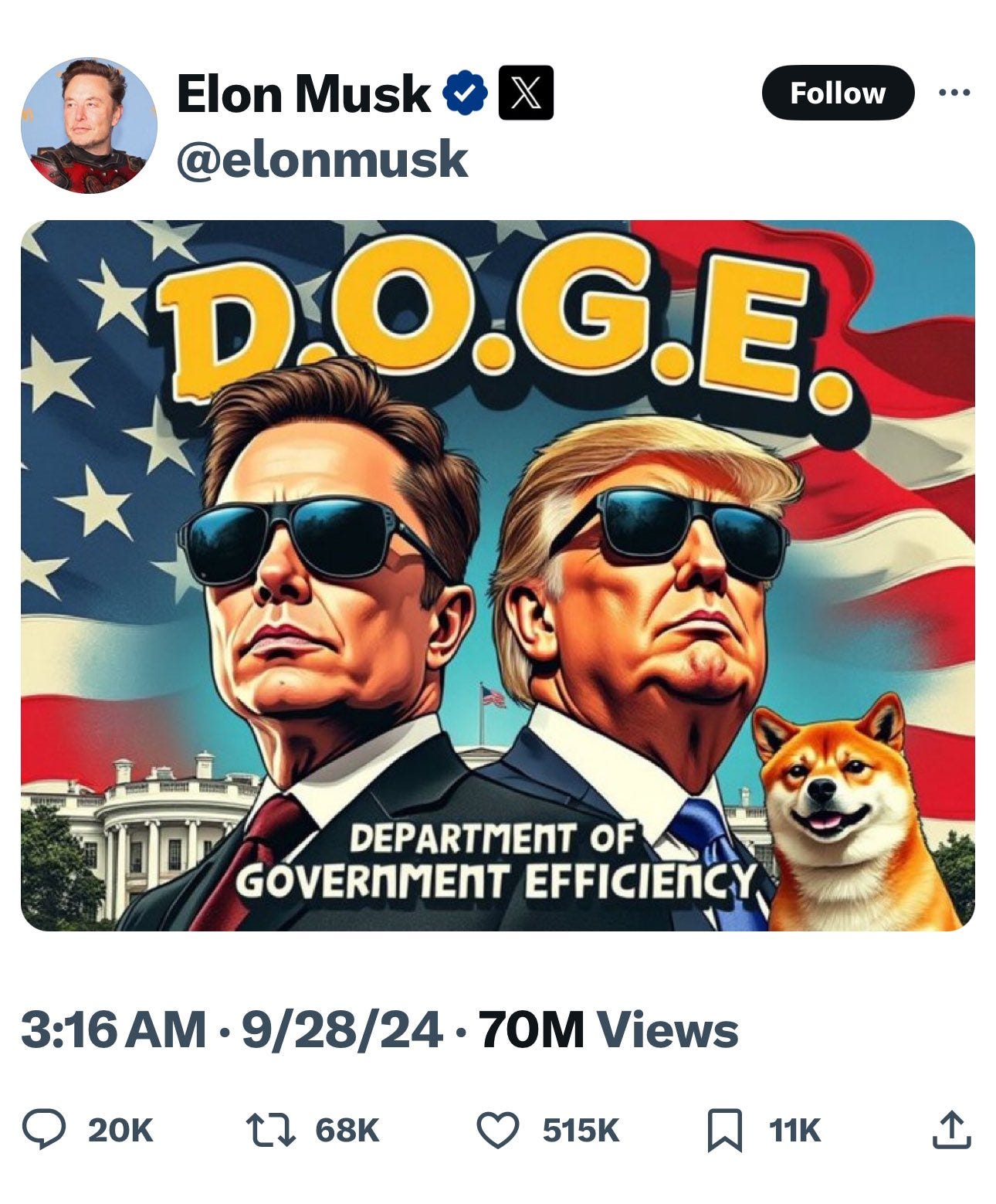
Donald Trump’s fascination with tech is, oddly, conjoined inexorably with his fixation on language. Not erudite deployments of rhetoric or literary presentations, of course, but the way cutting-edge tech can be used to move parcels of disinformation around.
What we increasingly find in Trump’s obsession with legacy is a concurrent belief that his legacy can and will be established via disinformation moving around the world at the speed of light via instruments controlled by allies of his like Elon Musk. And yes, we must deem relevant here, in considering Trump’s quickening interest in dynastic formation, his long obsession—in its highest relief after the deadly far-right riot in Charlottesville, Virginia in 2017—with the penchant of what he perceives to be the American “left” (really just nonpartisan historians) to recast famous figures from the past as deeply problematic. When Trump opines about what the youth are taught about those Founding Fathers who were slaveholders, for instance, one can hear a burgeoning anxiety about how future generations will see a sitting President of the United States who violated his Oath of Office and deliberately incited insurrection.
We might also notice how Trump likes to try to change history in real time, often by skewering the original meaning of words like “Communist” or “fascist.” Or one might have observed his obsession with branding. Or his insistence that his children—except Tiffany, of course—be kept close enough at all times to be some of his chief agents in all his business conduct and misconduct. Or his love affair with foreign authoritarians who dictate to their peons how they and their actions will be memorialized. Or even his campaign’s use of the phrase “unified reich” in a political ad plumping Trumpism.
But there are even more troubling indicators of what The Family intends it if accesses political power again in the United States. Shrewd news readers may have noticed that Trump, his allies, and his fans have lately taken to describing the 2020 George Floyd Protests in a fashion that bears no resemblance to what happened in the summer of 2020; despite large-scale studies showing that nearly 95% of all George Floyd protests were entirely peaceful, and that many of the remaining protests were “hijacked” by organized-crime syndicates that had nothing to do with any social justice movement, Trumpists have taken to saying that the 2020 protests “burned American cities to the ground”—a degree of feverish, even deranged hyperbole that begs the question, “Why so discombobulate recent history in this way?” While it’s beyond question that there were incidents of violence and arson in a vanishingly small number of George Floyd protests, but even these incidents were scattered and (except in a handful of instances) quickly contained. Contending, instead, that large mobs of nonwhite leftists “burned cities to the ground” this decade looks like a prelude to invoking the Insurrection Act of 1807 if large protests against a hypothetical second Trump administration emerge.
As Proof has covered in exhaustive, fully sourced detail for years now, one of the major schemes in play on January 6 was for Trump’s allies to “false flag” January 6 as either an “antifa” operation, a Black Lives Matter operation, a “Deep State” operation, or else a combination of all three—with the purpose of the scheme being to give Trump an excuse to invoke the Insurrection Act and use the powers under that Act to nullify the 2020 presidential election. This is why, as Proof has reported, the pro-Trump Proud Boys wore antifa “black bloc” clothing on January 6; why Proud Boys-linked anarchist John Earle Sullivan was falsely identified by insurrections as a member of Black Lives Matter (an organization that in fact had long ago banned him from any of its events, having identified him as an anarchist agitator); and why insurrectionists have been falsely claiming for years now that the USCP invited them into the Capitol.
When we add to the above that Trump is known to have wanted to shoot protesters in the past—he was stopped by the sort of Adults in the Room who will have no part in a hypothetical second Trump administration—what we get is a powder keg waiting to explode early on in such a hypothetical administration, one that leads to Trump being in a position to dictate his legacy and his successors by fiat (aided by the sort of far-right instruments his followers have built on Twitter, Spotify, and across cable news—from Newsmax to RSBN, Fox News to OANN, indie shows on Rumble and YouTube and too many thousands of radio broadcasts and podcasts across the country to count).
For a democracy to fall, it needs a ruling family, rich backers, comms control, and the complicity of the military. The Family has three of the four—and the 2022 Proof book Proof of Coup: How the Pentagon Shaped An Insurrection, confirms that Trump has come as close as any American in 160 years to gaining access to all four of the tyrant’s tools.
Enter J.D. Vance
If Donald Trump dies in office; if he is successfully impeached and convicted; if he is impeached and then temporarily transfers presidential powers to Vance for a pardon and then instantly recovers his presidential authority; if he finishes his hypothetical second term in such rough shape physically or psychologically or intellectually that he can’t make his intended push for an illegal third (and fourth) term; or if he somehow fails in his bid to bring Donald Trump Jr., Lara Trump, and Eric Trump into politics as quickly as he’d like (Barron Trump is too young to be in the picture for some time yet), J.D. Vance will become a transitional MAGA figure whose importance cannot be overstated.
It may be that Trump hates all other political dynasties out there—the Bushes, the Clintons, even the Obamas (who have no dynasty, but the fact that Michelle Obama significantly outpolls Trump surely irks him to no end)—but this is par for the course with Trump: he hates others doing successfully what he aims to do himself, in part because he wants history to record that he was the very first to do anything he did.
So what does J.D. Vance bring to Trump’s 2024 ticket? The obvious answer is nothing. The real answer is that he’s a bridge to what comes next—and a bridge that’s been carefully chosen for everything it is and, equally, everything it manifestly is not. Vance is young, and that’s essential if he’s going to have to carry the Trumpist banner from 2029 to 2033 or even 2033 to 2037, given that Trump Jr. has experienced a failure to launch in his political career. Vance is a moral cipher who close to the Family, now, at a level remarkably similar to another figure who could be a transition between stages of the Trump Dynasty—more likely between Stage 2 and Stage 3—that being Charlie Kirk, the Turning Point USA chieftan and taker-of-the-Fifth-Amendment-before-Congress (over January 6) who’s often been positioned as a sort of adopted Trump son.
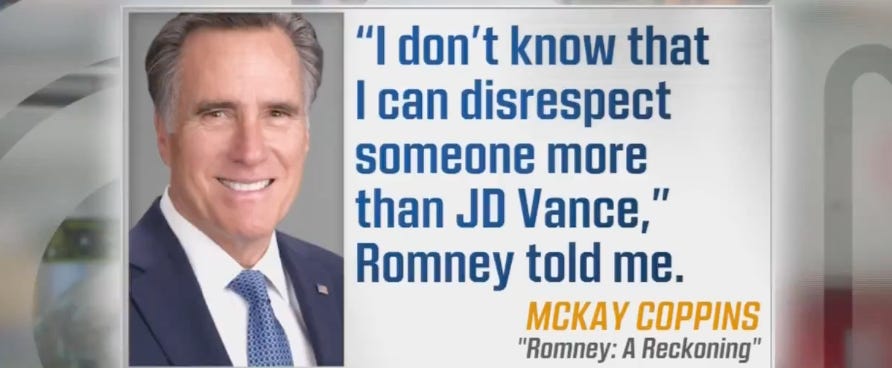
While Vance has a commitment to power-at-any-costs that to most people suggests a penchant for disloyalty, it doesn’t so appear to someone like Donald Trump because he is temperamentally disinclined to conceive of himself as someone “weak” enough to be betrayed. One of the few things Trump says publicly that he actually believes is that MAGA adherents are fervent to the point of militancy; it’s this earnest belief—one that isn’t entirely incorrect—that permits Trump not to fear Vance’s disloyalty but to in fact presume that Vance wouldn’t dare to be anything but loyal going forward.
Conclusion
Writing about J.D. Vance is a target-rich proposition. He won’t release his tax returns. He holds meeting with weirdos like Lance Wallnau, who was at the White House Ellipse on January 6 and was most recently seen declaring that Vice President of the United States Kamala Harris is a “witch” with a “Jezebel spirit.” He is, surprisingly, not just the least popular modern running-mate pick ever but also one of the most written about—with so many hundreds of reports detailing all the ways he’s not fit to be a vice presidential candidate that even an experienced curatorial-journalism outfit like Proof struggles to keep up. Even Tucker Carlson called him “weird.”
He schedules events at restaurants without booking them, leading to events held in parking lots. He is infamously thin-skinned. His private messages attacking Trump keep popping up. He keeps holding events sponsored by people who were in D.C. at the Ellipse on January 6—men who may have done nothing wrong, but who still, with their involvement with Vance, keep the bad memories of January 6 alive in the 2024 campaign. His verbal gaffes have offended virtually every demographic of woman in America and are too voluminous to detail here. Increasingly, major media reports that he is broadly “hated.” The fact that a joke about Vance and a couch not only went viral but remains stuck to Vance like Gorilla Glue is a testament to how genuinely creepy many voters think the man is. Even a minor gaffe, like his confusing Abbey Gate and Abbey Road, went viral. But again, does any of this actually move votes? It’s unclear.
More important may be the relationship Trump and Vance now have, per this report:
For a man who doesn’t “love” anyone—at least not in any way those of us with normal psyches would understand—Donald Trump is, surprisingly enough, quite the family man. He wants to sleep with his daughter Ivanka, he’s already creepily obsessed with his son Barron’s height (and it’s worth remembering that Trump gifted to Barron one of the fake names he used to spread fake news to the media with), and even as he has passed the Trump Organization mantle to his least-favorite son Eric, he seems to be doing all he can to ensure his eldest and most competent son Don Jr. remains in the political spotlight. Choosing one of his son’s best friends to be his new pseudo-son is in keeping with his desire to keep once-wayward Don Jr. yoked to the political realm.
Those who exhibit loyalty to Trump can stay in his inner circle forever, no matter how vile they are.
There’s a reason Fox News analyst Jessica Tarlov—perhaps the only journalist worth watching on that network—calls Vance a “security blanket” for Trump. He knows the Ohio senator will do whatever is asked of him, to the point that Vance recently made clear that he would have launched a Trump dictatorship in January 2021 by rejecting Biden electors from all battleground states. Vance has also confirmed that he will gift Vladimir Putin, as a reward for his war crimes, a sizable chunk of Ukraine—forcing the European nation and U.S. ally to surrender to Russia under a threat of being cut off from American aid. All this and more offers Mr. Trump a measure of comfort the somewhat scrupulous Mike Pence never did, even as it must never be forgotten (as much as certain journalists like Maggie Haberman inexplicably seem to wish to elide it) that it was a late push by Don Jr. and two white supremacists—Tucker Carlson and Elon Musk—that somehow put Vance over the finish line as Trump’s running mate.
Americans cannot afford to forget this history as they prepare to watch Vance debate Democratic vice presidential nominee Gov. Tim Walz (D-MN) on Tuesday in the first and only vice presidential debate and—it seems—the last political debate of any kind in the 2024 election cycle. It is insufficient to simply frame Vance as a “bad” pick, as in fact he was exactly the pick Trump wanted and needed for reasons that should scare Americans who love democracy, hate bloodline tyrannies, and value our Constitution.
Coda
Another take on J.D. Vance—in line with the one above—that is well worth reviewing:





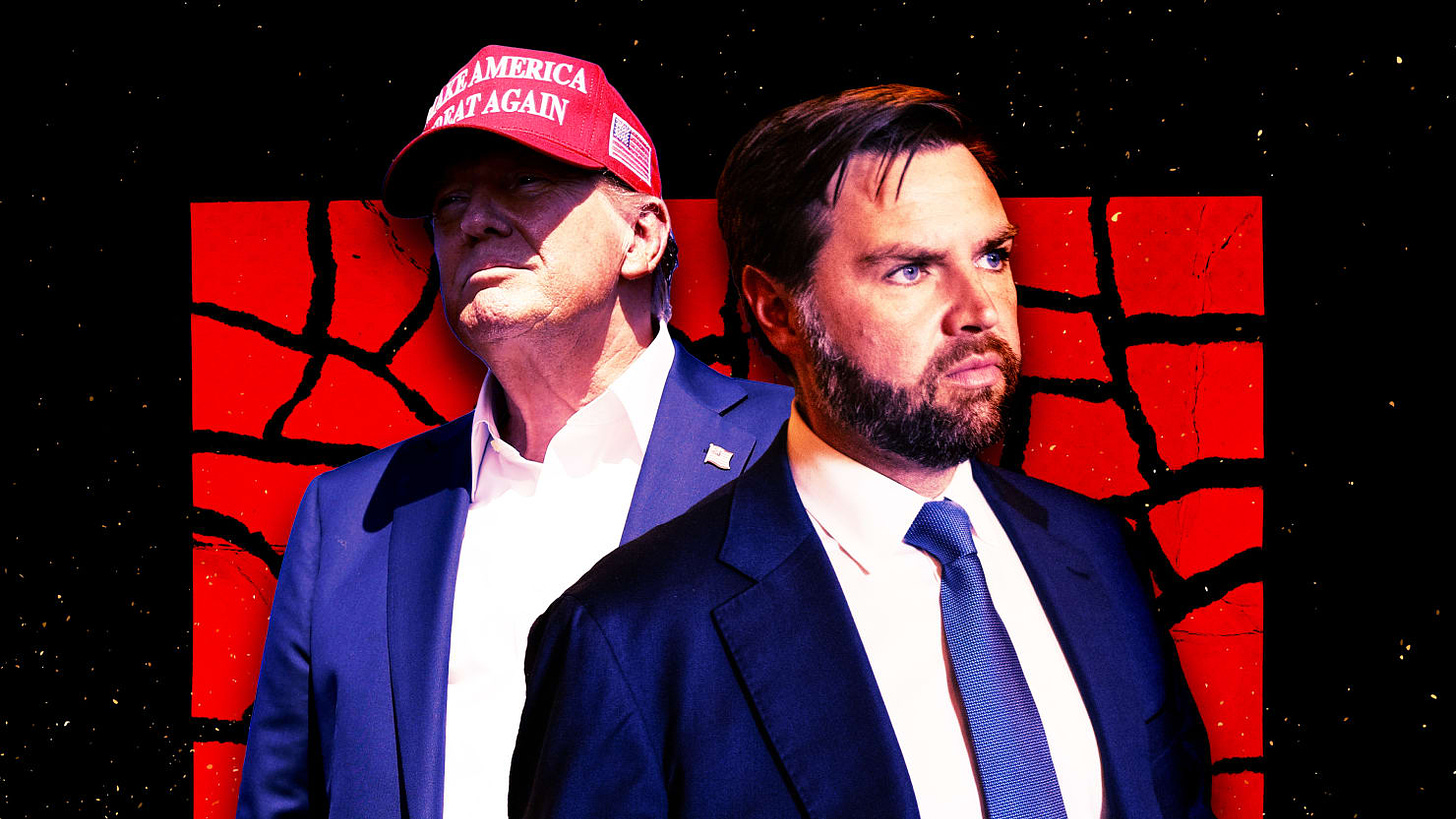
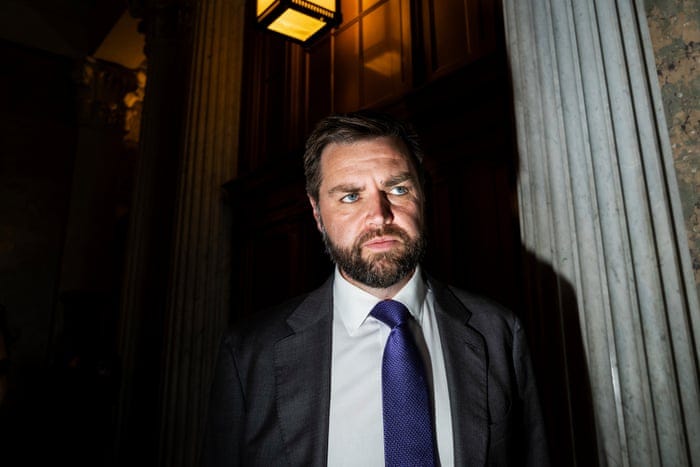
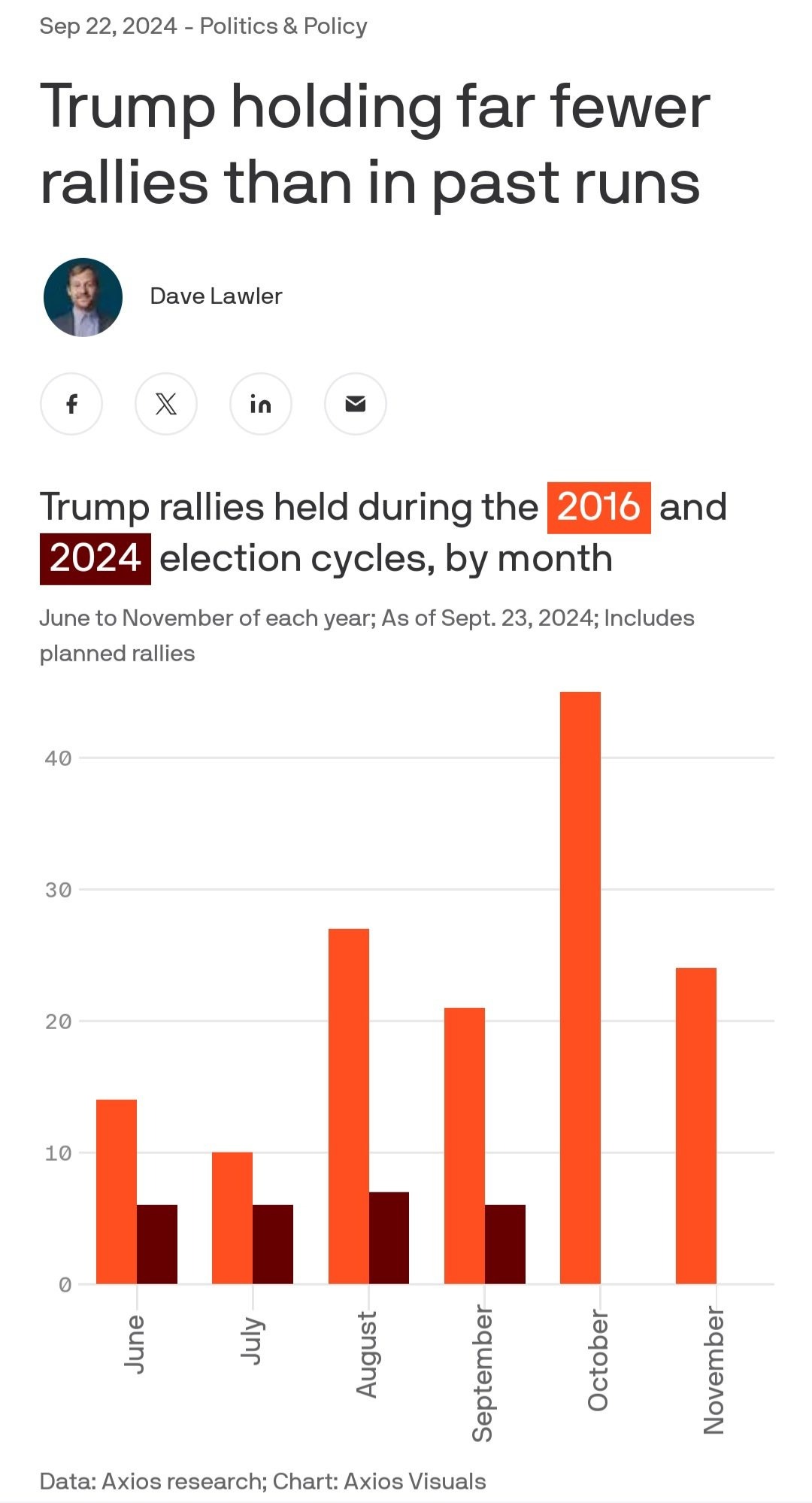
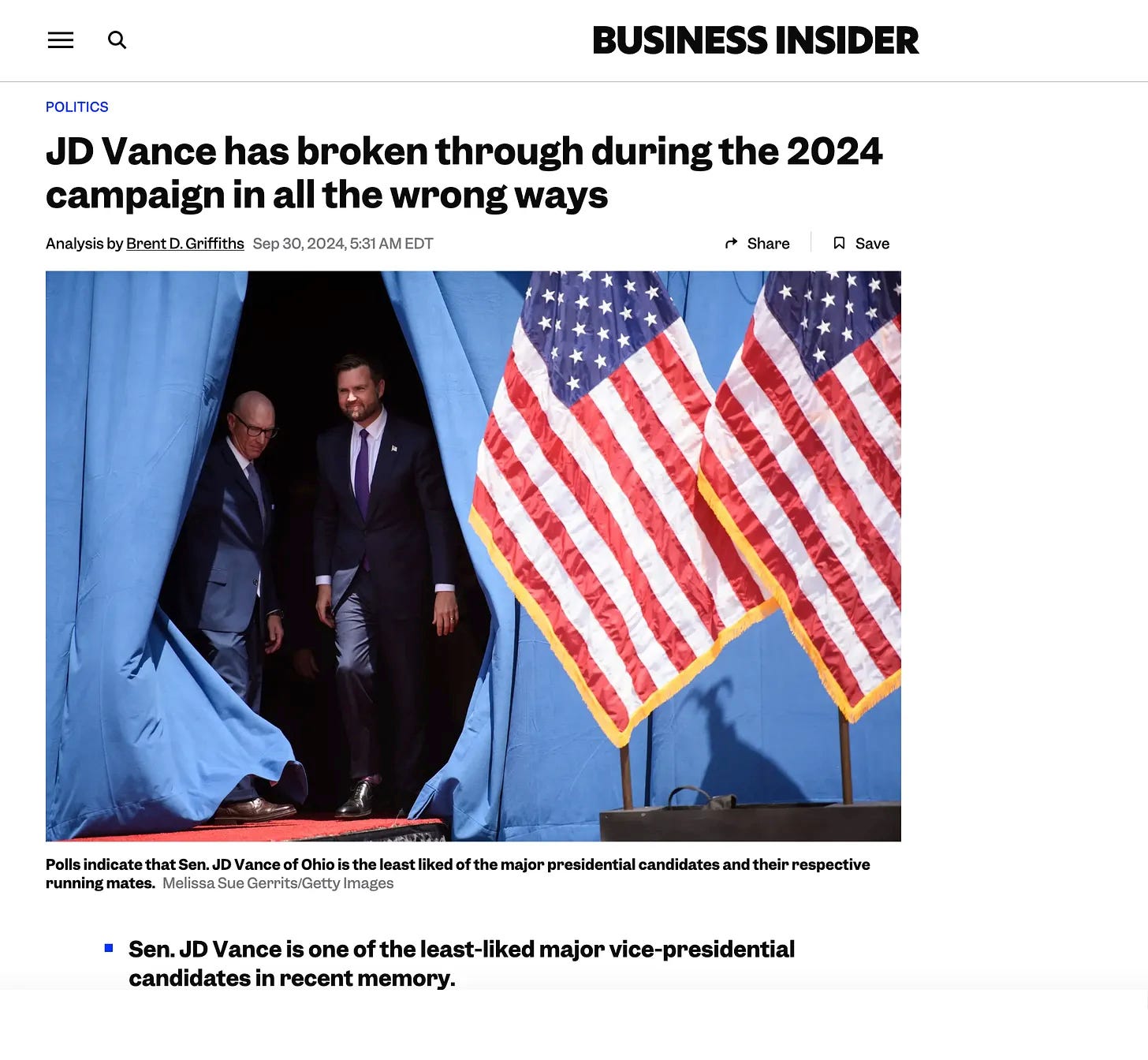
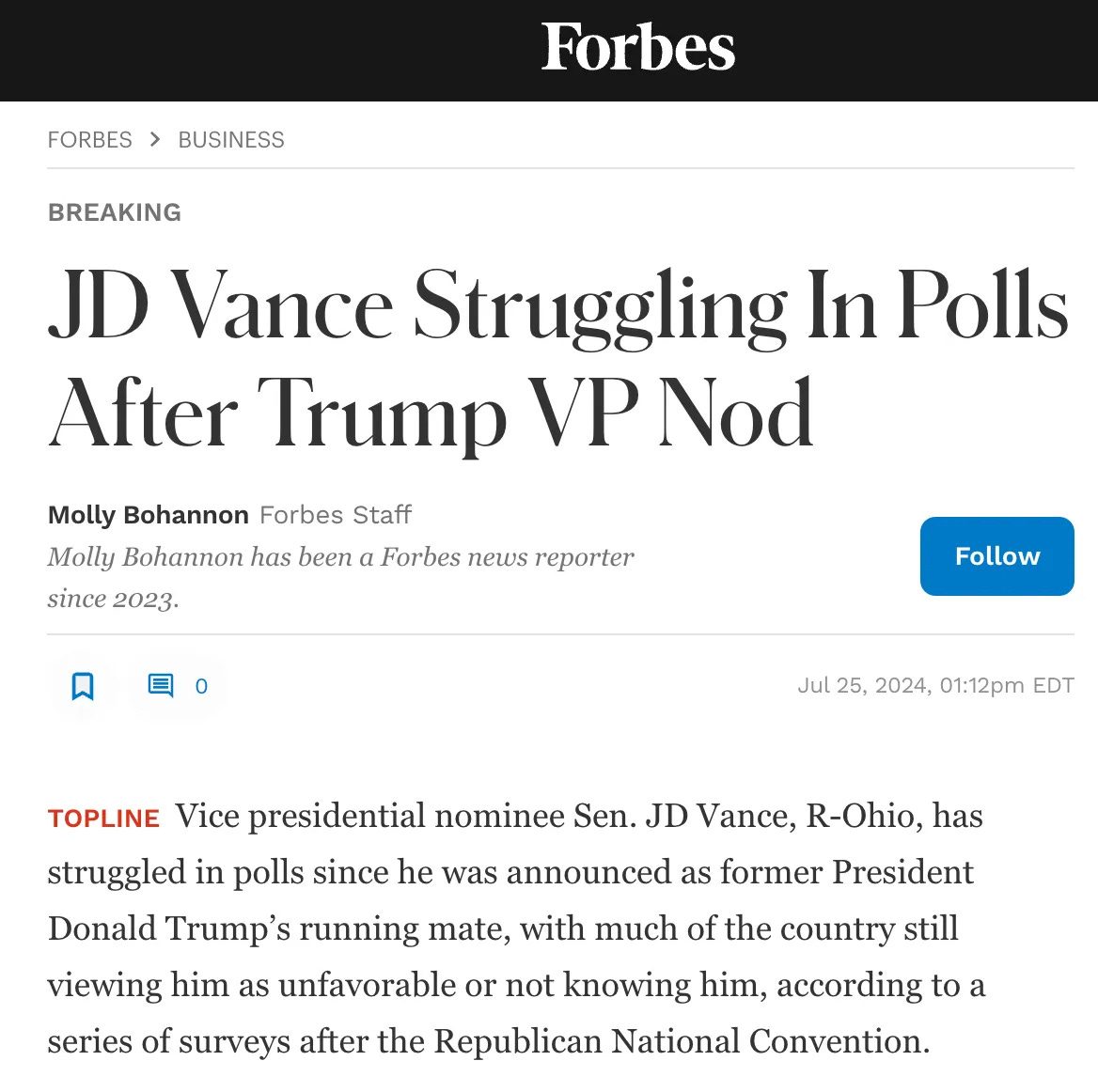
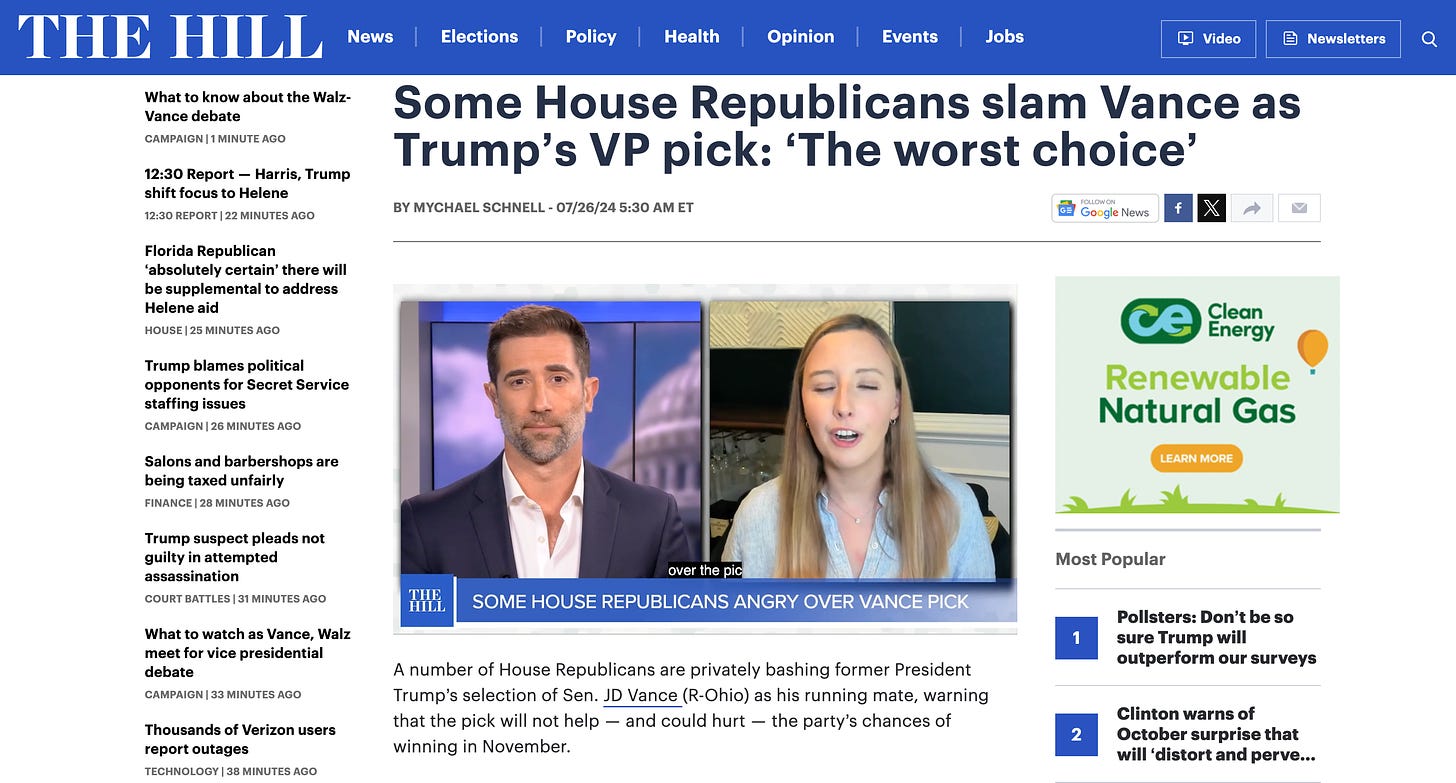
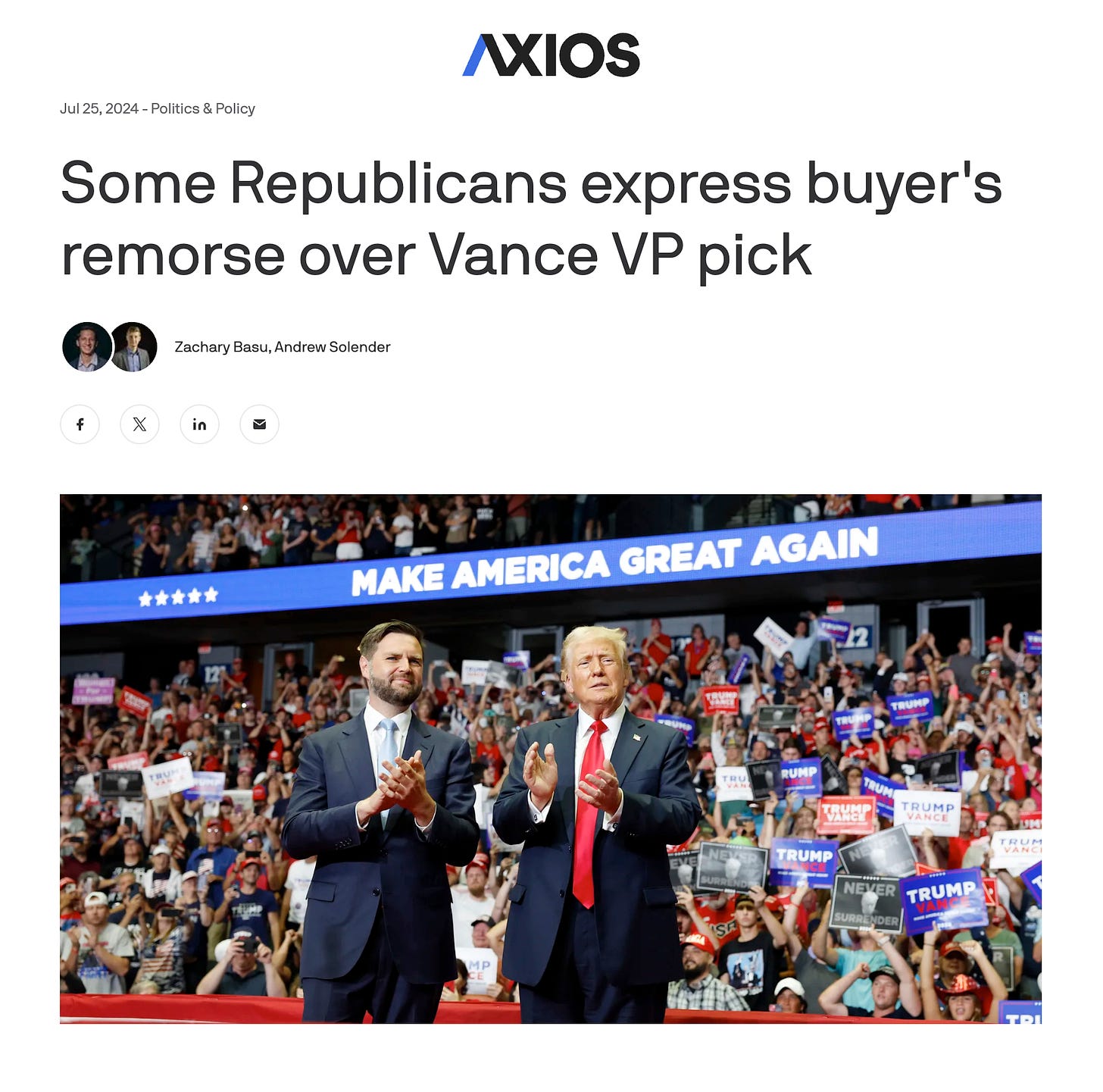
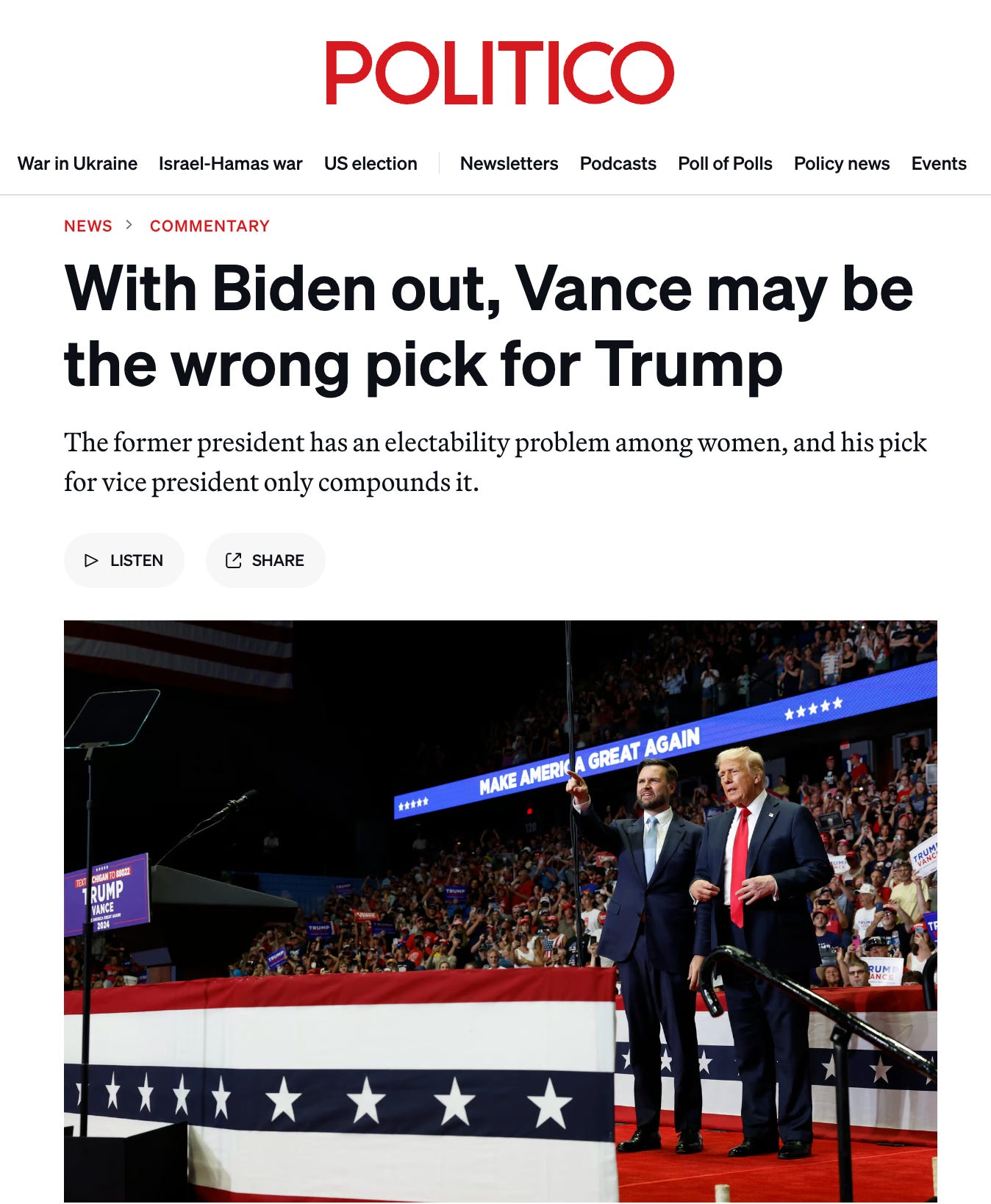
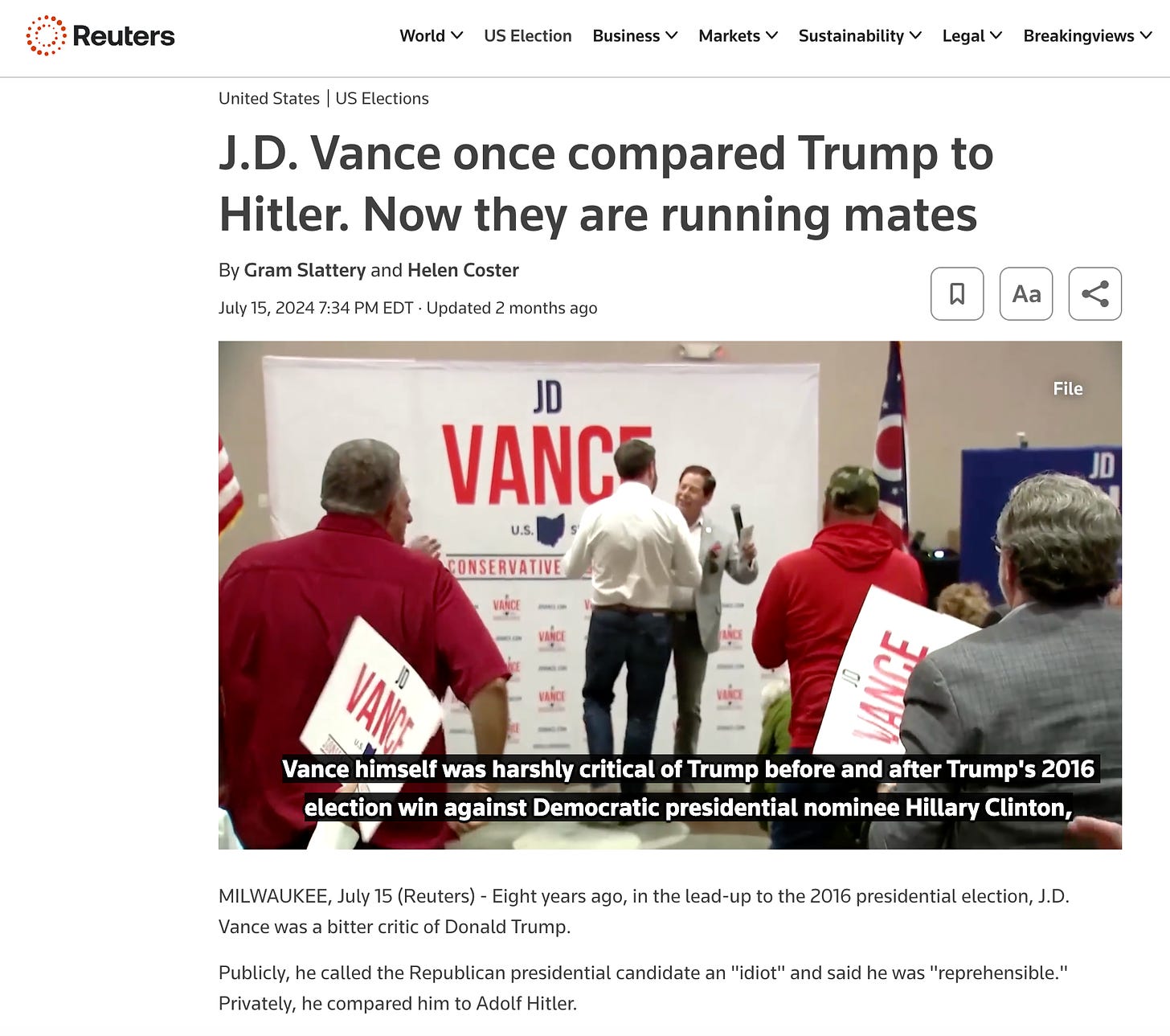
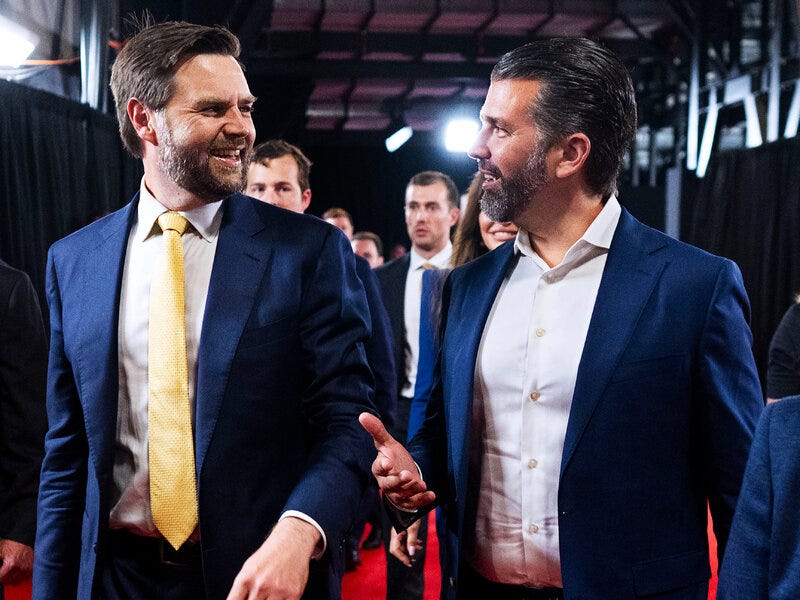
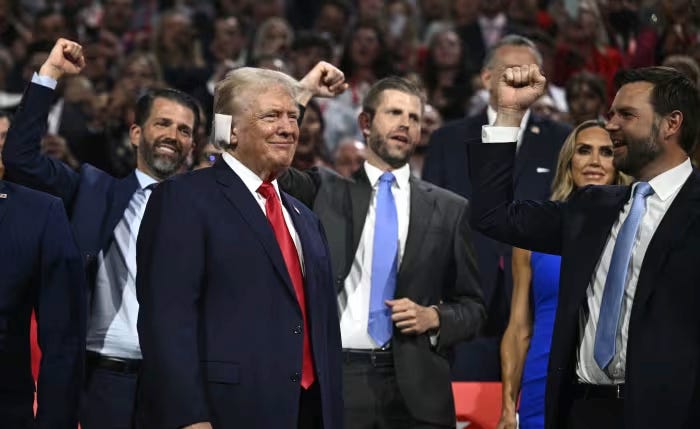
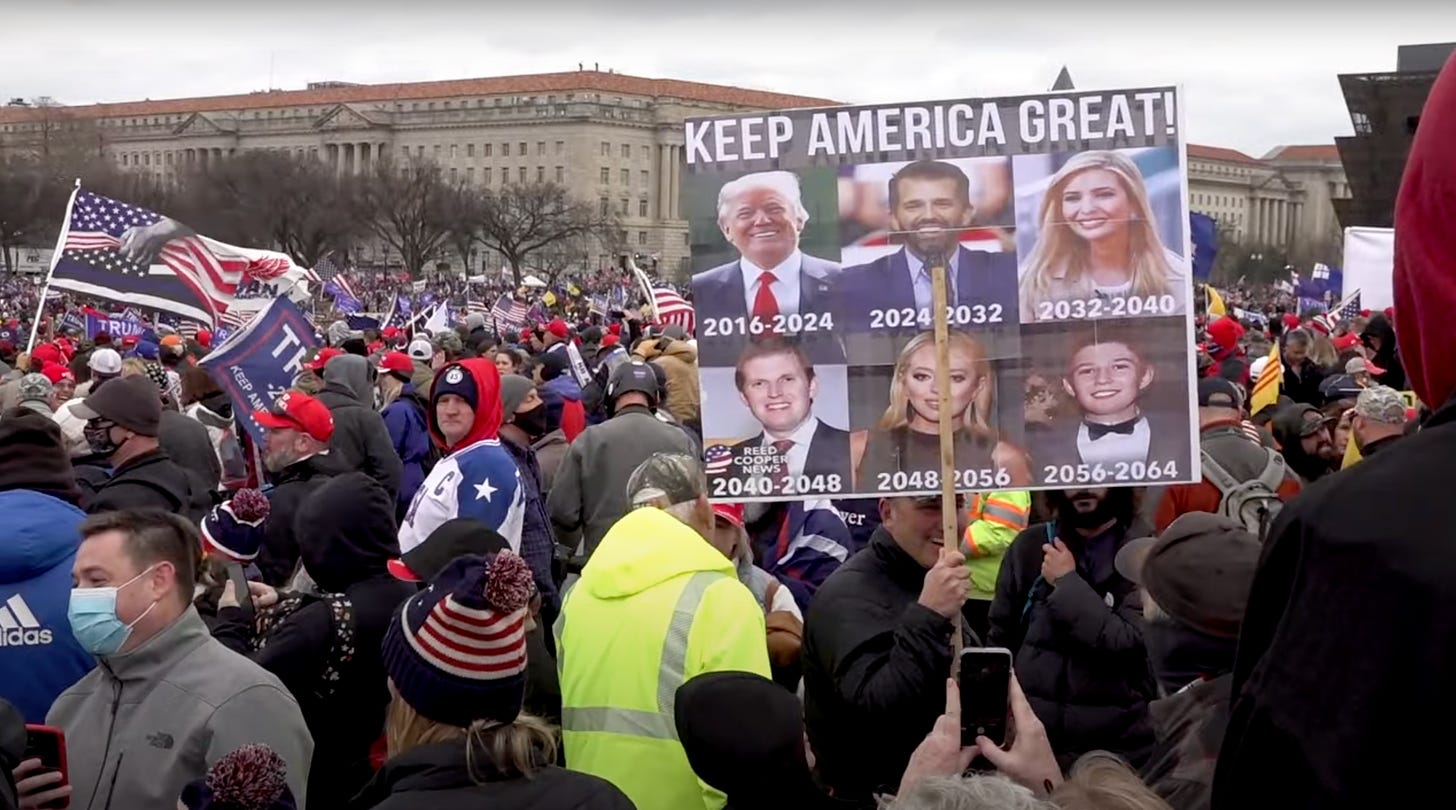
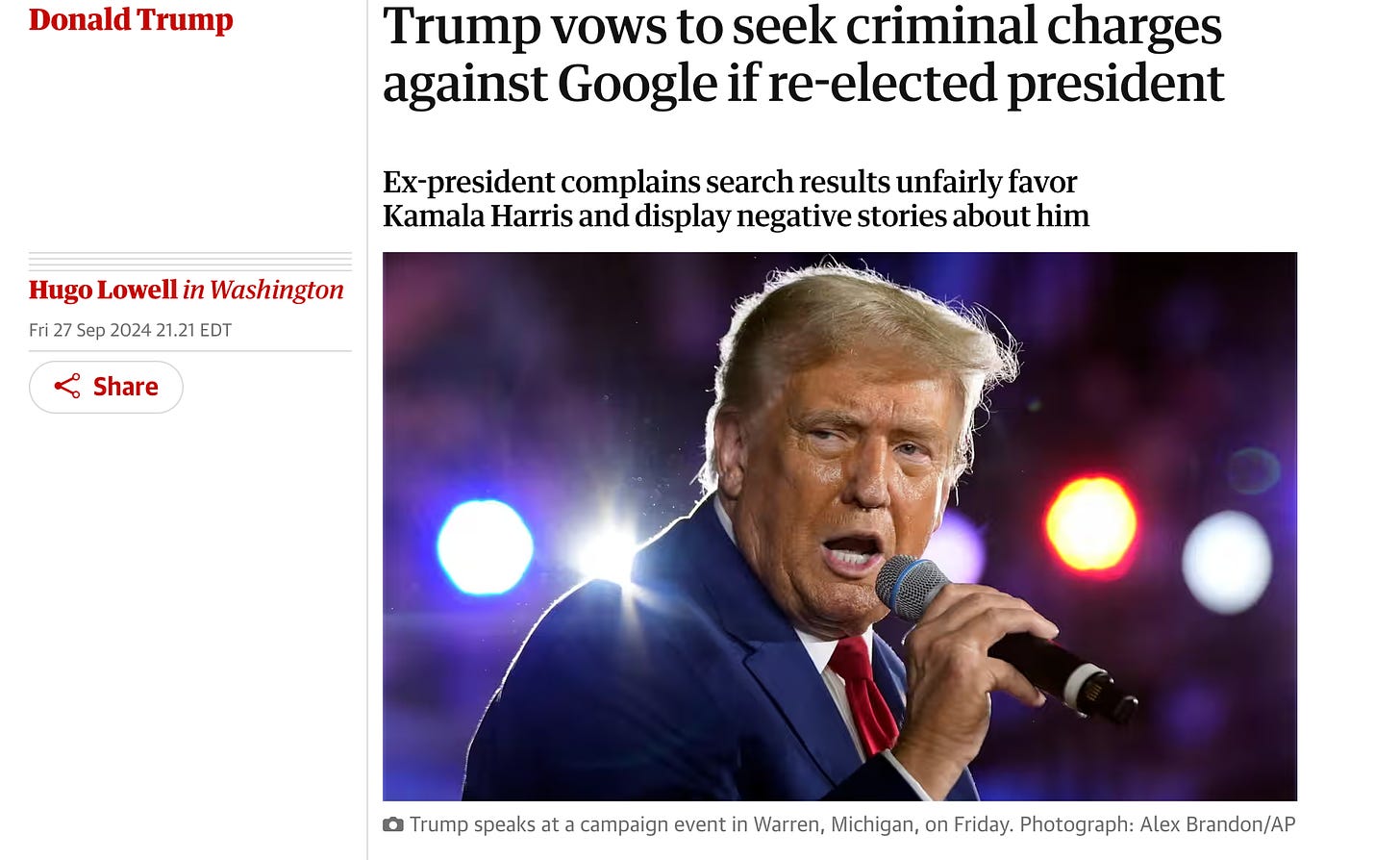
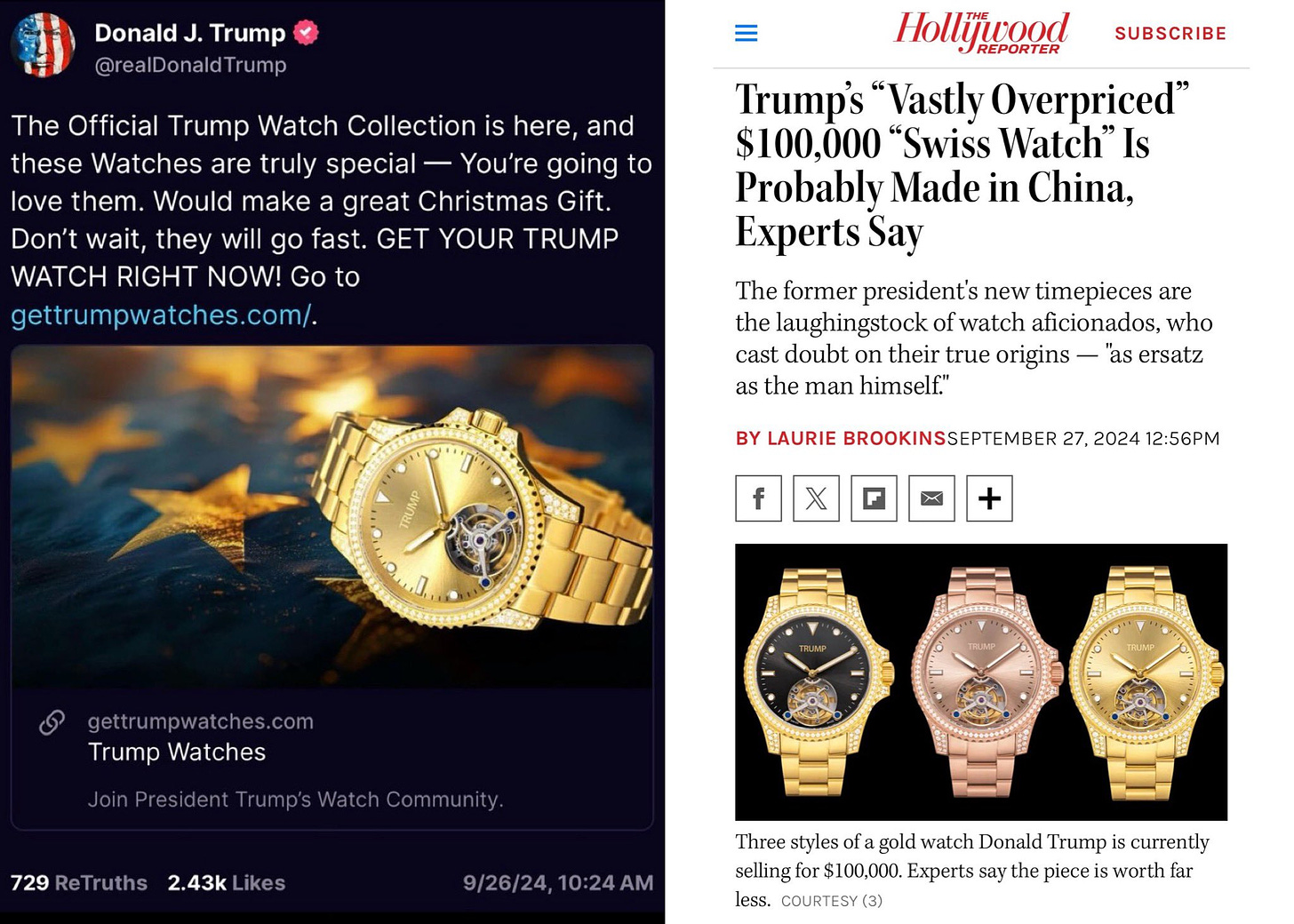

The relationship between Musk and Thiel sort of loops through history. They both got rich off Pay Pal; they came back together in 2015 to fund a little start-up called Open AI.--and got yet richer as they sold their stakes to the likes of Microsoft. They re-converged at the Trump campaign, checkbooks in hand, just as Vance was named VP pick. Is their next project a hostile takeover of the United States.? They both ooze Bond-villain vibes.
To pick up on thread of the Insurrection act of 1807. That is the set up. Tramps latest claim of 1 hour of massive brutal police brutality, is the justifiable action in response. Laura Tramp is the sleeper cell of the dynasty. Don Jr. newly reported infidelity is a like father like son strategy which further solidifies in the Maga mind that they are getting the younger version of the Donald. And no one seems to care he is using the 50 year old and dumping her for a younger more stylish replacement. The other thing of note in the Musk doge meme is that Tramp seems to dislike pets. Putting the doggy next to him is a symbol of I own you and you can do nothing about it. Anyone including the entire department of Justice, FBI, CIA, house intelligence-who did not see Tramps entrance into crypto as a way of taking foreign money and money laundering (particularly in the face of his being caught doing the same thing with US currency), just are not paying enough attention. Tramp loyalists think of Romney as a RHINO so…I also agree, never trusted Ivanka nor Jared distancing themselves except it is helpful that the Abraham Accords do not enter any discussion of the Middle East troubled which it surely would if he was in sight lines. Also, they have a job to do, moving around the world making deals with foreign governments Albania, Serbia, Croatia, I mean nibbling away at the edges. So yes, he is going about his dynasty planning like he does everything else. Covertly insinuating himself into every sector, nook and cranny to make it appear conspiratorial. The 360 like all great narcissistic manipulators.